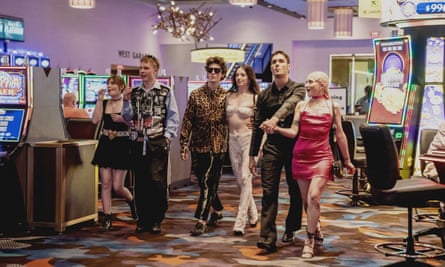Her name is Anora but everyone calls her Ani. She’s fluent in Russian but prefers to speak English. She dances at a strip club, which means she’s emphatically not a sex worker, even if she occasionally moonlights as one on the side. Ani, it’s clear, is smarter and tougher than she lets on to her clients. But the woman’s a mess; she’s compromised and conflicted. Probably the world around her is too.
Anora, the brilliant new picture from American writer-director Sean Baker, is a screwball Cinderella tale – frenetic and funny, fiery and profane. While Baker has already won plaudits for his previous work (Tangerine, The Florida Project, 2021’s Red Rocket), this boisterous New York caper vaults him towards greatness. Anora combines instinctual deft handling of its volatile subject matter with a jubilant, swing-for-the-fences ambition. But the film’s a joint triumph and shares the spoils with its star. Cast in the title role, 25-year-old Mikey Madison gives a performance for the ages. She rustles up a flawed, fearsome heroine who’s as gorgeous and grubby as life.
It almost goes without saying that Ani’s strip club attracts all manner of losers, but some of these deadbeats are more solvent than others. Vanya (Mark Eidelstein), for instance, is the gawky, spoilt son of a Russian oligarch, with free run of his parents’ Brighton Beach mansion and altogether more money than he knows what to do with. Vanya’s a sweet kid but weak, with the gaucheness of a teenager and the selfish greed of one too. Making like Richard Gere in Pretty Woman, he offers the dancer $15,000 to be his “horny girlfriend” for the week. Ani promptly confesses that she’d have taken the gig for 10 grand. Vanya grins and admits he’d have gone as high as 30. Such is the measure of the love that’s between them.
All relationships, perhaps, are in part transactional. At least in this case it’s upfront, even honest. Vanya’s the buyer and Ani’s the seller. He brings cold, hard cash to the table while she provides the sexual fireworks (also spark and grit, which only makes the sex better). And so for a time these two might convince themselves that they’re equals, business partners, and that their confected romance might just work out fine. It’s only after their Las Vegas wedding that the souffle collapses in spectacular style. Vanya and Ani surfed through the nuptials on a tide of champagne and cocaine. The comedown will be brutal – and for the bride most of all.
What a jolting, tragicomic journey Baker and Madison arrange for us here. Their film clatters and squeals like an unoiled crosstown train, kicking up sparks as it veers from midtown Manhattan to snow-blown Coney Island and from tawdry fantasy to harsh, hard reality. Anora deepens and darkens with each twist and turn and provides a violent corrective to so many Hollywood fairytales. But it also understands that these stories have certain rules that must be followed – at least for a while, so as to break them with more force. Ani’s a plaything; a toy to be tossed away. But she is also a wrecking ball. Aim her just right and she’ll bring the house of cards crashing down.

Sure enough, Anora hits its shrill crescendo during a sustained slapstick sequence at Vanya’s luxury pad, when a pair of hapless Russian goons arrive to annul the marriage. The two men march in, remonstrating with Vanya and barely giving the woman a second glance. But her response has them reeling; the living room is in pieces. She’s kicking and biting. She simply won’t be restrained. It is a superb, breathless set piece: savage and hilarious and on the outer edge of control.
after newsletter promotion
Anora premiered at this year’s Cannes film festival, where it went on to win the Palme d’Or. I saw it there and loved it, albeit with slight, nagging reservations. Maybe the tale lost velocity in its bleary-eyed closing stretch. Maybe Ani’s interaction with one of the goons felt a little suspect and contrived. On a second viewing, however, the whole thing makes perfect sense. Anora’s last act is a blinder. The final scene is the coup de grace. And if the ending feels uncomfortable, well, that’s precisely the point. Film’s relationship with its viewer, Baker suggests, is its own cheap transaction. Its clients demand happy endings or they feel short-changed and let down. Ani understands what’s required and performs her role with aplomb, to the point where she is no longer certain what is fake and what’s real.
-
In UK and Irish cinemas

.png) 2 months ago
19
2 months ago
19













































